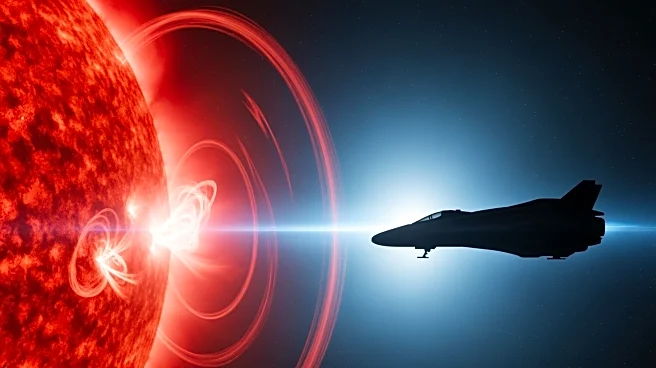What's Happening?
Blue Origin has postponed the launch of NASA's ESCAPADE Mars probes due to a powerful solar storm. The New Glenn rocket was scheduled to launch from Cape Canaveral Space Force Station, but the solar activity, which caused auroras as far south as Florida,
led to the delay. The storm originated from sunspot group AR4274, releasing a G4 coronal mass ejection towards Earth. NASA decided to postpone the launch to protect the spacecraft from potential adverse effects of the solar storm. Blue Origin is assessing future launch dates based on space weather forecasts and range availability.
Why It's Important?
The delay highlights the impact of solar activity on space missions, emphasizing the need for careful planning and monitoring of space weather. Solar storms can affect spacecraft electronics and communication systems, posing risks to missions. The postponement underscores the challenges faced by space agencies in ensuring the safety and success of their missions. It also reflects the growing importance of understanding solar phenomena and their effects on Earth and space technology. The ESCAPADE mission aims to study the solar wind's impact on Mars' atmosphere, contributing to our knowledge of planetary atmospheres and space weather.
What's Next?
Blue Origin and NASA are working to reschedule the launch, considering space weather conditions and regulatory approvals. The Federal Aviation Administration has imposed restrictions on commercial launches during daytime hours due to a government shutdown, adding complexity to the rescheduling process. Once launched, the ESCAPADE mission will provide valuable data on Mars' atmospheric dynamics, aiding future exploration and potential human missions to the planet. The delay may prompt further research into mitigating the effects of solar storms on space missions, enhancing the resilience of spacecraft.
Beyond the Headlines
The delay due to solar activity highlights the interconnectedness of space weather and terrestrial technology. It raises questions about the long-term impact of solar storms on Earth's infrastructure and the need for improved forecasting and mitigation strategies. The event also underscores the importance of international collaboration in space exploration, as understanding solar phenomena requires global efforts. As space missions become more ambitious, addressing the challenges posed by space weather will be crucial for the success and safety of future endeavors.
















